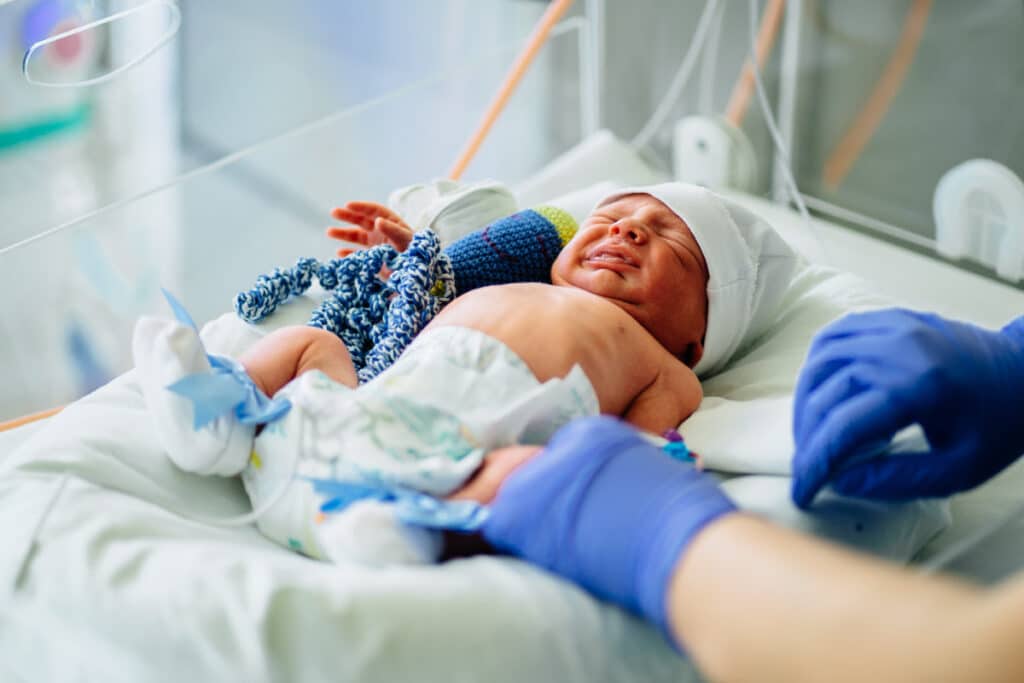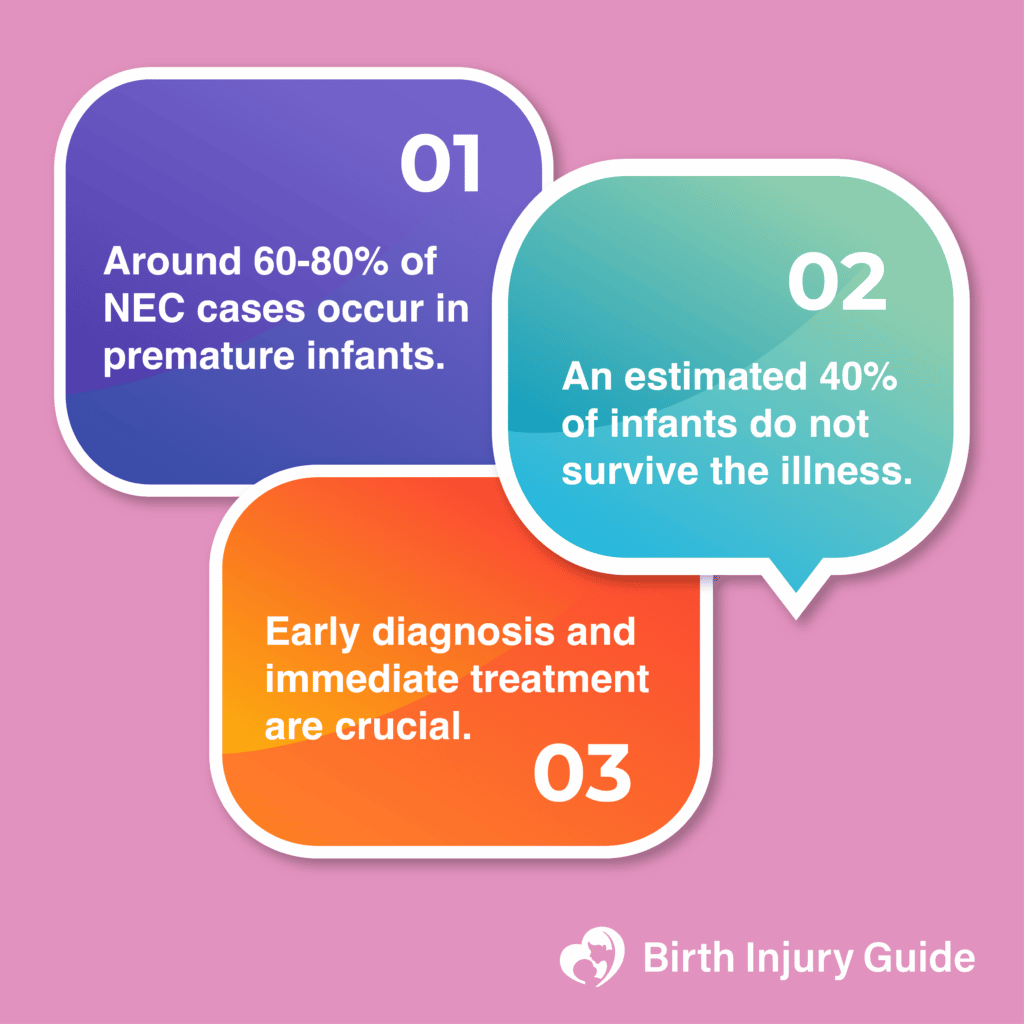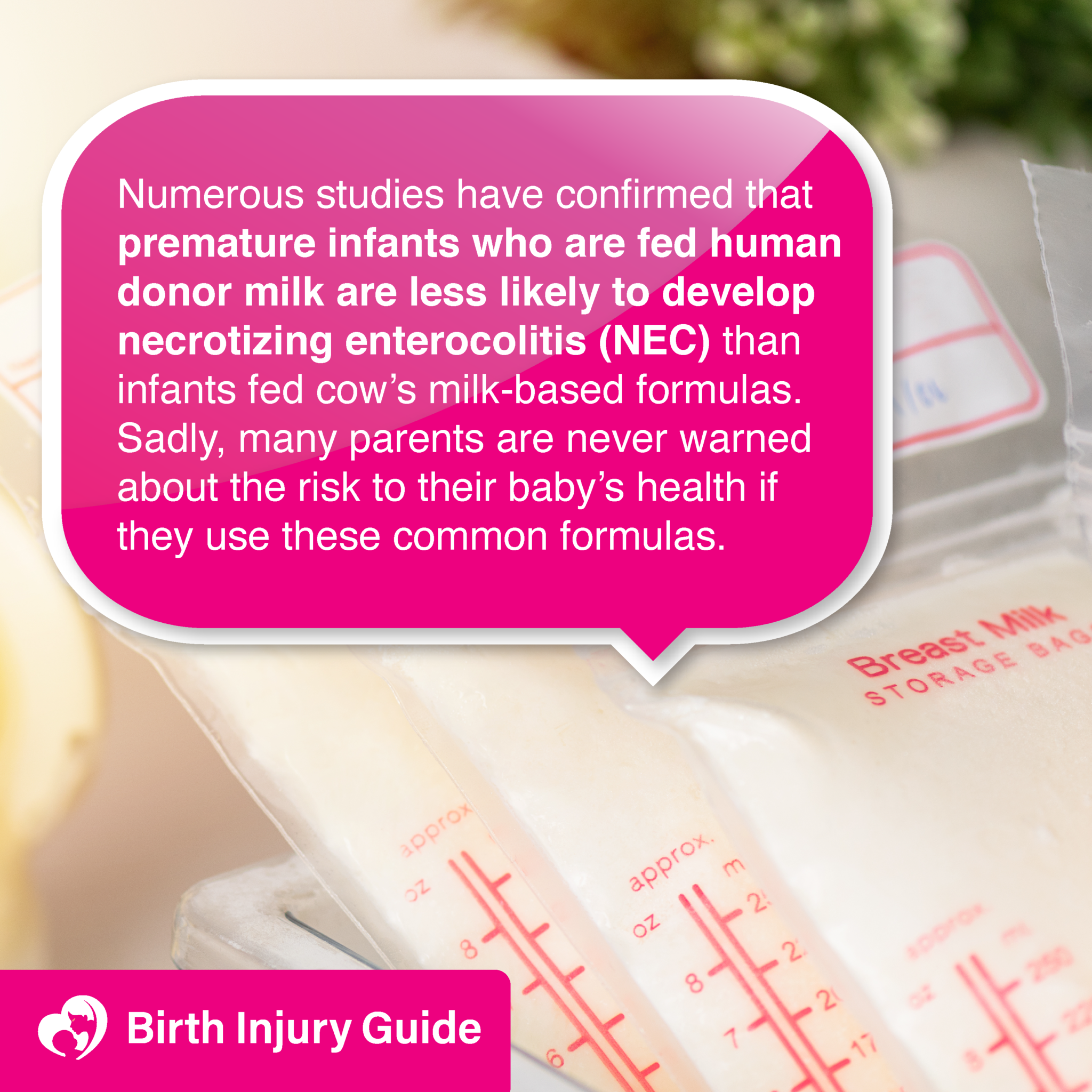Legal Help for Families Impacted by Necrotizing Enterocolitis (NEC)

We Fight for Your Rights so You Can Focus on Your Family
Did your infant develop necrotizing enterocolitis (NEC) after being fed cow’s milk-based formula in the neonatal intensive care unit (NICU)?
Birth Injury Guide helps families affected by birth injuries, including NEC. Our goal is to help you explore the details of your situation and determine if you have an actionable claim. If so, we will help you fight for your child’s legal rights.
If your infant developed NEC due to cow’s milk-based formula, you may be able to pursue compensation.
What is Necrotizing Enterocolitis?
Necrotizing enterocolitis (NEC) is a serious medical condition that primarily affects premature babies. NEC occurs when the lining of the intestine becomes damaged and begins to die (necrosis). Then, the intestinal wall becomes inflamed and infected.
With prompt diagnosis and treatment, infants with NEC can recover completely. However, if it is not taken care of on time, NEC can cause permanent damage and can even be fatal.

Necrotizing Enterocolitis Causes
The exact cause of NEC is unknown, but experts believe there are several factors that contribute to its development, such as:
- Oxygen deprivation during birth
- Use of cow’s milk-based formulas
- Excess red blood cells
- Other gastrointestinal conditions
Prematurity is also a leading risk factor for NEC, with 60%-80% of all cases occurring in premature infants.

Necrotizing Enterocolitis Symptoms
NEC generally develops in the first days or weeks after birth. It often develops while the infant is still in the hospital. As a result, if you notice your child has any of the following symptoms, you should speak with your neonatologist immediately:
- Abdominal swelling
- Abdominal discoloration
- Poor feeding
- Vomiting
- Diarrhea
- Bloody stool
Additionally, your infant may experience general symptoms of infection, such as difficulty breathing, fever, or lethargy.
Diagnosing Necrotizing Enterocolitis
Diagnosing NEC requires a complete physical examination and a series of tests. Therefore, your doctor may do the following to confirm an NEC diagnosis:
- Gently manipulate your child’s tummy to check for pain, swelling, or tenderness
- Order an abdominal x-ray for detailed images of the intestine
- Testing stool samples for the presence of blood
- Order blood tests to check white blood cell and platelet counts (low platelets or high white blood cell count can be indicative of NEC)
- Inserting a needle into the abdominal cavity to check for intestinal fluid in the abdomen
Necrotizing Enterocolitis Treatment
Treating NEC depends on several factors, such as the child’s overall health and the severity of intestinal damage. In most cases, feeding will be discontinued and the child will be fed nutrients through an IV. Moreover, the infant will likely receive antibiotics.
Some infants that have abdominal swelling have difficulty breathing. In these cases, doctors will also provide oxygen support. Infants with severe intestinal damage may require surgery to remove damaged or dead tissue.
NEC and Medical Negligence
As mentioned before, prompt diagnosis and treatment are critical to improving a child’s prognosis. If your infant has suffered permanent damage or died due to a doctor failing to diagnose, misdiagnose, or failed to treat NEC, you may have a valid medical negligence claim.
Medical negligence is unacceptable, and you have the right to be angry and want justice for your child and family. Should you choose to pursue a medical negligence claim, you can seek compensation for your child’s medical bills, pain and suffering, disfigurement, and lost wages you have suffered.
Speak with a Birth Injury Lawyer for Free
If your infant is suffering from NEC or another birth injury, contact the Birth Injury Guide today. We help families with birth injury cases involving cerebral palsy, hypoxic-ischemic encephalopathy (HIE), infant brain damage, and more. We can advise you of your legal rights and help you build your claim.
At Birth Injury Guide, your consultation is completely free and confidential. Get started now by calling us at (866) 913-0571 or completing our online contact form below.
Sources:
- https://medlineplus.gov/ency/article/001148.htm
- https://rarediseases.org/rare-diseases/necrotizing-enterocolitis/
- https://www.merckmanuals.com/professional/pediatrics/gastrointestinal-disorders-in-neonates-and-infants/necrotizing-enterocolitis
- https://www.nestlenutrition-institute.org/docs/default-source/global-dcoument-library/publications/secured/cb25d06f76a402e0eb888a210332722c.pdf?sfvrsn=50ad4c60_0
- https://www.medela.us/breastfeeding-professionals/blog/is-it-time-to-say-goodbye-to-the-cow-in-the-nicu
- https://link.springer.com/article/10.1007/s40124-014-0062-8